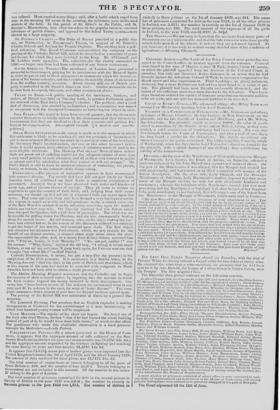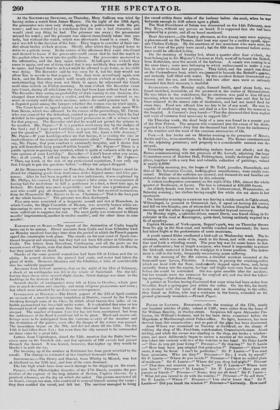the exercise of their restored rights, by inquiring into the
manner in which Death—Thomas Gill, stealing goods, value 121W. and upwards, in a dwelling-house ; the Irish vestries expend the money intrusted to their management. One W. Henry Carr, for utterimf a forged order for the payment of 711finCy; Saran Bowen, vests has at been known to vote 2/. 18s. a-dozen for sacramental wine in one for stealing goods, value is!. ill a dwelling-house; Richard Harper Green, for utter- ing a forged bill of exchange; joint Davy, alias Wheeler, for breaking into a dived. year, and 31. Is a-dozen in the next, for wine of better flavour:" The same ling-house; James Bray, for stealing goods, value 1;:i. in :1. dwelling:louse John paper announces that a system of poor laws for Ireland hasbeen agreed upon. Dearman and William Powell, for entering a dweliing-house and stealing therein ; The passing of the Relief Bill was celebrated at Ennis by a general ilk- John Shiny and Robert Nixon, for robbing in a dwelling-house; James Smith, for uttering counterfeit shillings, having been previously convicted as a common titterer; minafion. Sarah Ash, for a like offence' Eleanor Fox and Mary Steel, for highway robbery; The Limerick Evening Post mentions that an English capitalist is making Patrick O'Donnel and Peter Daley, for robbery on Elizabeth Coombes ; John Harris, arrangements at. Clonroael for the establishment of a lace manufactory, in for burglary; John Pettit, for robbery in a dwelling-house; Thomas Gee. Hawkins and John Ballard, fur breaking into a dwelling-house, and stealing therein.
Transportation for Life—Eliza Green, Thomas Higginbottom, George Bassett, Edward Etudes, Eliza Davis, Mary Ann Coran, Ellen Simpson, George Morgan, Wil- liam Hewitt, William Heron, and Margaret Sullivan. For Fourteen Years—George Perryman, Charles Sullivan, Ann Keene, Joseph Gibbons, Francis Beck, Thomas Smith, Harriette Storer, Alfred Hawkins, Martha Soper, and William Connell.
For Seven Years—Ann Pitt, James Hill, Henry Brown, William Perry, Ann King, Susan James, John Judson, James Jones, James Hobbs, William Davis, John Wat- son, Edward Evridge, Samuel Oakley, Richard Goodall, Edward Gable, Henry Grady, Stephen Smith, Edward Colbrook, John Hannan, Henry Williams, William Stirling, John Sellers, John Warren, George Collins, Robert Hurst, John Jones, James Taylor, Charles Austin, Horatio Elisha, John Plympton, George Hooper, William Watts, William Howell, John Moss, Jane Ritchie, William Davis, Thomas Harding, James Haywood, Ann Maria Martin, Sarah Stevenson, George Kilpatrick, John Newman, John Scales, William Holmes, John Macnamara, James Avery, Sarah Mason, Maria Toomey, James Reynolds, Eleanor Connor, Jane Harvey, Thomas M`Carty, George Gray, John Thomas, Mary Morris, William Jones, Wil- liam Pope, Henry Bacon, John Brown, Robert Carter, Robert Barn, Thomas Mans- field, Jane Chappel, Ann Cordwell, Thomas Purdy, John Goodrich, Robert Wood- ward, William Tuck, James Golding, William Jay, Charles Dunn, Elizabeth Spice, Ann Taylor, and John Butler, who was convicted of having stolen the clothes, &c. of the unfortunate Mr. Neale, of Regent-street.
A great number of prisoners convicted of minor offences were sentenced to vari- ous terms of imprisonment and hard labour in the House of Correction, and several juvenile delinquents were ordered to be privately whipped in the gaol of Newgate.
The Court adjourned till the 11th of June.
At the SOUTHWARK SESSIONS, on Thursday, Mary Sullivan was tried for having stolen a watch from James Munro. On the night of the 10th April, the prosecutor was seen very drunk, quitting a public-house with the pri- soner; and was warned by a watchman that she was a had character, and would steal any thing he had. The prisoner ran away ; the prosecutor missed his watch ; and the prisoner was almost immediately taken into cus- tody, but without the watch, which was afterwards found in a court. The case was left to the decision of the Jury. They began to consider of their ver- dict about twelve o'clock at noon. Shortly after which they begged leave to retire to a private room. In the course of the afternoon they came into Court and desired to know if the prosecutor could swear that he had the watch in his pocket when he went into the public-house. The prosecutor answered in the affirmative, and the Jury again retired. At half-past six o'clock they came in again, and one of them stated that it was not likely they would be able to agree, and hoped that he at least might be allowed to go home, as his child was dying. The Recorder said he was sorry for it, but his duty would not allow hint to accede to that request. The Jury were accordingly again sent back, and the Recorder waited until nearly eleven o'clock at night ; when, understanding that they were not likely to agree, he adjourned the Court until nine o'clock on Friday morning. At nine o'clock the Recorder caine into Court, during all which time the Jury had been kept without food or fire. The Recorder then seeing no probability of their coming to any decision, dis- charged them without giving a verdict, and the prisoner was ordered to re- main in custody until the next sessions, unless she could procure bail. It is a disputed point among the lawyers whether the woman can he tried again.
The Court heard an appeal against an order of affiliation, made upon Wil- liam Bevan, which was affirmed. In the course of the proceedings, Mr. Payne, who was counsel for the deffindant, omitted to prove some facts which he had detailed in his opening speech, and begged permission to call a witness back for that purpose. The Recorder said that he would not permit the witness to be recalled. Mr. Payne—" It is a practice used every day by the Judges of the land ; and I hope your Lordship, as a personal favour, will allow me to put the question." Recorder—" You shall not, Sir: learn a little decency." Mr. Payne—If your Lordship refuse me that favour, it is visiting the sins or inadvertencies of the counsel on the unfortunate client." Recorder—" I must say, Mr. Payne, that your conduct is extremely irregular, and I desire that you will henceforth keep yourself within bounds." Mr. Payne—" There is a public opinion respecting my conduct, which is quite at variance with the pri- vate opinion of your Lordship." Recorder—" I don't know what you mean, Sir: at all events, I will not have the witness called back." Mr. Payne- " Then, my Lord, at the risk of my professional reputation, I can only say that I forgot to put the questions before."—Here the subject dropped.



















 Previous page
Previous page